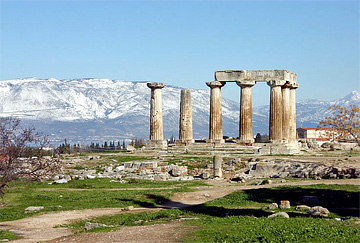In my last post I worked with the question: “Whose church is it?” The answer from 1 Corinthians is clear. The church is God’s church. The church is the creation and “property” of the triune God. Acknowledging this means that when we’re in the midst of church conflict, we must seek God’s will for God’s church above all.
Today I want to ask a related “big question”: What is the church? What is this entity that belongs to God?
On the simplest level, a church is a gathering of people who belong to God through faith in Jesus Christ. Wherever Christians come together in Christ, there is a church. But this is just the beginning. In 1 Corinthians 3 Paul speaks of the church in striking and surprising language:
Do you not know that you are God’s temple and that God’s Spirit dwells in you? If anyone destroys God’s temple, God will destroy that person. For God’s temple is holy, and you are that temple. (3:16-17)
For years I read this passage as speaking about me as an individual Christian. A parallel text in 1 Corinthians 6 does indeed speak of the body of the Christian person as a temple for God’s Spirit (6:19). But the emphasis in chapter 3 is different. Here the temple of God is the church, the gathered fellowship of believers.
The context in 1 Corinthians 3 makes it clear that Paul is not focusing on individual believers when he says “you are God’s temple.” In verse 9, the Corinthian church is “God’s building” (3:9). Those who labor as church-planters are in the construction business, so to speak (3:10-15). So when we come to verse 16, we know that the temple of which Paul speaks is not the individual believer but the assembly of believers. The verse might be paraphrased: “Do you not know that you folks [plural in Greek] are God’s temple and that God’s Spirit dwells among you?” Or, to use the language of my new home state, “Do y’all not know that all y’all are God’s temple?”
This interpretation is confirmed in verse 17, which warns the Corinthians not to destroy God’s temple. The first three chapters of 1 Corinthians have to do, not with threats to individual believers, but with the threat of division in the church at Corinth. So when Paul says, “If anyone destroys God’s temple,” he’s referring to the church of God in Corinth, which is at risk because of the conflicts in the church. (Photo: The columns in the center of this picture are what’s left of the Corinthian temple for the Greek god Apollo.)
 Part of what makes the church so special is the presence of God’s Spirit. When believers gather together, God is with them through his Spirit. The power of God is available so the church can be strengthened. Paul will have much more to say about this in chapters 12-14.
Part of what makes the church so special is the presence of God’s Spirit. When believers gather together, God is with them through his Spirit. The power of God is available so the church can be strengthened. Paul will have much more to say about this in chapters 12-14.
From the mere fact that the church is God’s temple, you’d naturally conclude that it ought to be treated with reverence and supreme care. But in case you missed that implication, Paul adds: “If anyone destroys God’s temple, God will destroy that person” (3:17). Now that’s a threat to take notice of, don’t you think? Before you start trifling with the church of God, you’d better realize what you’re doing.
Sometimes, especially in the heat of church conflict, people can forget what they’re dealing with. They easily think of the church in human terms. I know pastors who have seemed almost willing to destroy a particular church in order to defend their reputation or career. How sad this is! And, given the threat of 1 Corinthians 3:17, how ill advised.
On the contrary, I have seen church leaders sacrifice their advantage for the sake of God’s church. A friend of mine was pastoring a solid and growing church when a faction that didn’t like his leadership tried to force him out. As he prayed about what was best for God’s temple, my friend decided that it would be best if he resigned. Though he felt sure that he could defeat his foes, he also believed that this fight would seriously damage the church. His career, his income, his reputation . . . none of these mattered as much as the church he loved so much. So he resigned.
I’m not suggesting that every embattled pastor should quit. But I am suggesting that every one of us, especially if we’re in the midst of church conflict, should realize, not only that the church belongs to God, but also that it is his temple, the dwelling place of his Spirit. With this in mind, we will do everything in our power both to honor and to protect the church, even if it involves self-sacrifice.
So, if you’re in the midst of church conflict, step back from the issues long enough to remember what it is you’re dealing with. Are you thinking of your church as the temple of God? Are you doing everything you can to protect and care for God’s temple?
This blog post is part of the series: God’s Guidance for Christians in Conflict. You can read the series in logical order by clicking on the link.

